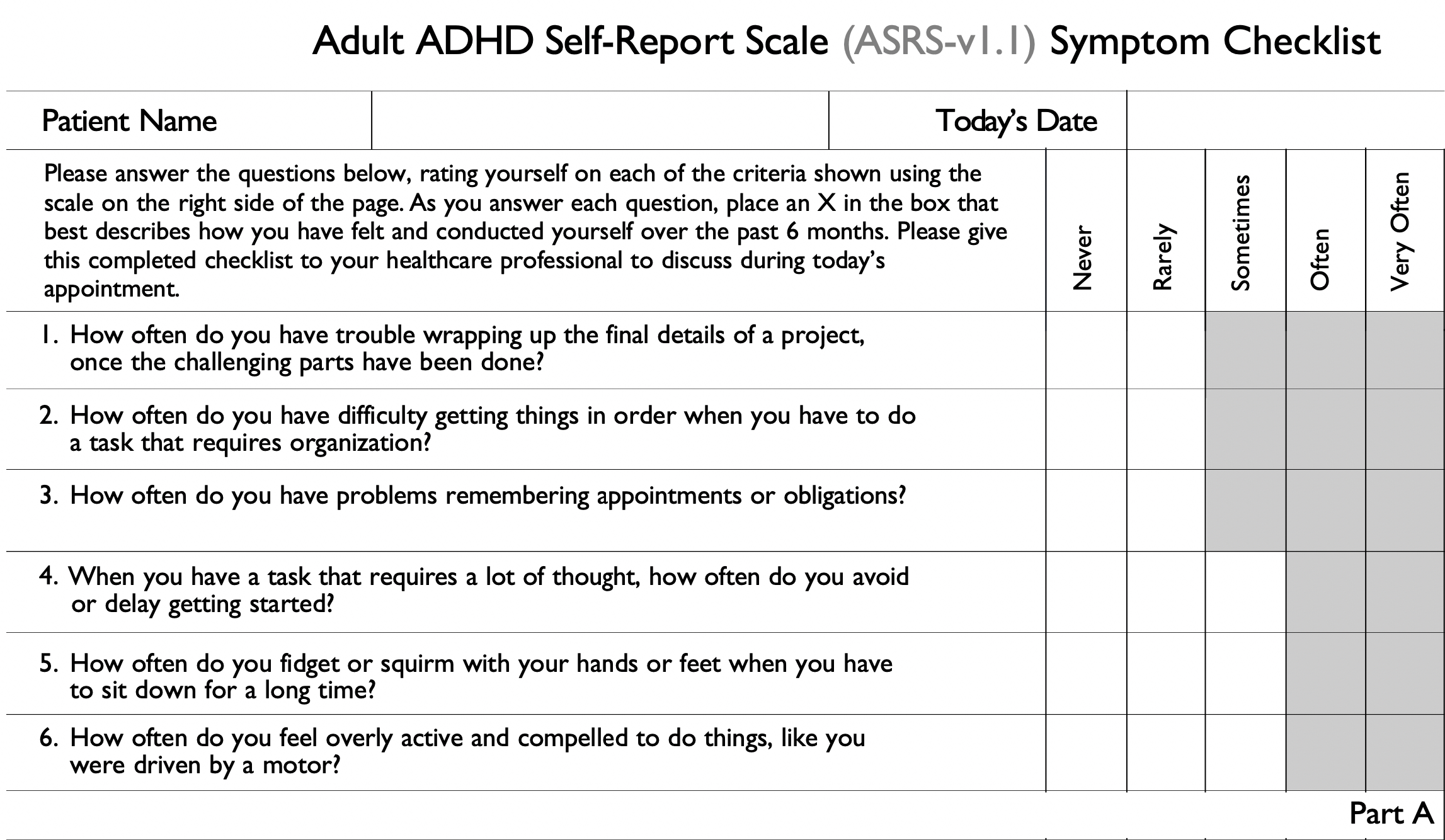Facing A Possible Adult ADHD Diagnosis: A Practical Guide

Table of Contents
Recognizing the Signs of Adult ADHD
Adult ADHD presents differently than in children. While hyperactivity might be less pronounced, other symptoms can significantly impact daily functioning. Understanding these subtle signs is crucial for seeking the right help.
Common Symptoms in Adults:
-
Difficulty focusing and sustaining attention: Struggling to concentrate on tasks, easily distracted by external stimuli, and experiencing mind wandering are common. This can lead to problems completing projects and feeling overwhelmed.
-
Problems with organization and time management: Chronic disorganization, difficulty prioritizing tasks, and consistent lateness or missed deadlines are frequently reported. This can affect work performance and personal responsibilities.
-
Impulsivity and restlessness: Making hasty decisions without considering consequences, interrupting conversations frequently, and experiencing an internal feeling of restlessness are key indicators.
-
Hyperactivity (in some cases, more internal restlessness): While outward hyperactivity might be less evident in adults, many experience internal restlessness, fidgeting, or difficulty staying still.
-
Challenges with emotional regulation: Experiencing intense emotional swings, difficulty managing frustration, and impulsive emotional reactions are often associated with Adult ADHD.
-
Difficulty prioritizing tasks: Struggling to determine the most important tasks, leading to procrastination and feeling overwhelmed by even small to-do lists.
-
Forgetfulness and losing things frequently: Misplacing keys, forgetting appointments, and struggling to remember daily tasks are common experiences.
-
Problems with planning and completing tasks: Difficulty breaking down large tasks into smaller, manageable steps, resulting in unfinished projects and feelings of inadequacy.
-
These symptoms must significantly impact daily life to be considered diagnostic.
-
Symptoms vary greatly between individuals; some may experience primarily inattention, while others might exhibit more hyperactivity or impulsivity.
-
Self-assessment tools online can be helpful for initial screening, but professional evaluation is crucial for accurate diagnosis.
-
Consider keeping a detailed journal to track your experiences and symptoms. Note the frequency, intensity, and impact of each symptom on your daily life. This information will be invaluable for your assessment.
Seeking Professional Help for ADHD Assessment
Seeking a professional assessment is a critical step in understanding whether you have Adult ADHD. The right professional can provide an accurate diagnosis and guide you towards effective treatment.
Finding the Right Professional:
- Consider psychiatrists, psychologists, or neuropsychologists specializing in ADHD. Ensure they have experience working with adults.
- Check credentials, certifications, and years of experience with adult ADHD diagnosis and treatment.
- Look for practitioners with positive patient reviews and testimonials. Online resources like health professional directories can help in your search.
The Diagnostic Process:
-
Expect a thorough evaluation, including detailed interviews about your history, symptoms, and daily challenges. Be prepared to discuss how these symptoms affect your work, relationships, and overall life.
-
You'll likely complete questionnaires and rating scales designed to assess ADHD symptoms.
-
In some cases, neuropsychological testing may be recommended to rule out other conditions and provide a more comprehensive understanding of your cognitive strengths and weaknesses.
-
Discuss your medical history and family history of ADHD, as genetics play a role in the disorder.
-
Be prepared to provide specific examples of how ADHD impacts your daily functioning. The more detailed your examples, the better the professional can understand your experiences.
-
The assessment process can take time, often involving multiple sessions. Be patient and persistent.
-
Don't hesitate to ask questions throughout the process. Understanding the diagnostic process and your treatment options is crucial.
-
Advocate for yourself and ensure you feel comfortable and understood by your chosen professional. A strong doctor-patient relationship is essential for successful treatment.
Understanding Your Diagnosis and Treatment Options
Once you receive a diagnosis, understanding the different types of ADHD and available treatments is crucial for developing an effective treatment plan.
Different Types of ADHD:
- Inattentive type: Primarily characterized by difficulties with attention, focus, and organization.
- Hyperactive-impulsive type: Characterized by hyperactivity, impulsivity, and difficulty controlling behavior.
- Combined type: Exhibits symptoms of both inattentive and hyperactive-impulsive types.
Treatment Approaches:
-
Medication (stimulants and non-stimulants): Medication can help manage core symptoms such as inattention, impulsivity, and hyperactivity. Stimulants are commonly prescribed, but non-stimulant options are also available.
-
Therapy (Cognitive Behavioral Therapy (CBT), coaching): Therapy helps develop coping mechanisms, improve self-management skills, and address underlying emotional challenges. Coaching can provide additional support and guidance in developing personalized strategies.
-
Lifestyle changes (diet, exercise, sleep hygiene): Improving diet, incorporating regular exercise, and prioritizing sleep hygiene can significantly impact symptom management.
-
Treatment plans are individualized and may require adjustments over time. What works for one person may not work for another.
-
Medication is not always necessary or suitable for everyone. Many find that therapy and lifestyle changes are sufficient.
-
Therapy can help develop coping mechanisms and improve self-management skills, providing long-term benefits beyond medication.
-
Lifestyle changes can play a crucial role in managing ADHD symptoms. These changes often require commitment and consistency.
Living with an ADHD Diagnosis
Receiving an Adult ADHD diagnosis is not the end of the journey; it's the beginning of actively managing your condition and improving your life.
Building Support Systems:
- Connect with support groups for adults with ADHD. Sharing experiences and connecting with others facing similar challenges can be incredibly helpful.
- Seek understanding and support from family and friends. Educating your loved ones about ADHD can help foster greater understanding and empathy.
- Consider working with a coach or mentor experienced in supporting individuals with ADHD. This personalized support can provide guidance and encouragement.
Developing Coping Strategies:
-
Time management techniques: Implementing techniques like time blocking, prioritizing tasks, and using timers can improve productivity and reduce overwhelm.
-
Organization strategies: Utilizing organizational tools like planners, calendars, and apps can significantly improve organization and reduce stress.
-
Mindfulness and stress management: Practicing mindfulness techniques like meditation or deep breathing can help manage impulsivity and improve emotional regulation.
-
Living with ADHD is a journey, not a destination. There will be challenges, but also significant progress.
-
Self-compassion is crucial. Be kind to yourself, celebrate your successes, and learn from setbacks.
-
Remember that managing ADHD is an ongoing process that requires patience, self-awareness, and a commitment to self-care.
Conclusion
Receiving an Adult ADHD diagnosis can be a significant step towards understanding and managing your challenges. This guide has provided a practical framework to navigate the process, from recognizing symptoms and seeking professional help to developing effective coping strategies. Remember, you are not alone. With the right support and treatment, including medication, therapy, and lifestyle adjustments, you can thrive. Take the first step today and explore the possibility of an Adult ADHD assessment. Don't let undiagnosed ADHD hold you back any longer. Start your journey towards a better life by seeking help for Adult ADHD.

Featured Posts
-
 Mlb 160km
Apr 29, 2025
Mlb 160km
Apr 29, 2025 -
 The Strain Of Touring Assessing Willie Nelsons Health Concerns
Apr 29, 2025
The Strain Of Touring Assessing Willie Nelsons Health Concerns
Apr 29, 2025 -
 Secure Your Capital Summertime Ball 2025 Tickets Today
Apr 29, 2025
Secure Your Capital Summertime Ball 2025 Tickets Today
Apr 29, 2025 -
 Guilty Plea Lab Owner Faked Covid 19 Test Results
Apr 29, 2025
Guilty Plea Lab Owner Faked Covid 19 Test Results
Apr 29, 2025 -
 Pete Rose Pardon Trumps Statement And Its Implications
Apr 29, 2025
Pete Rose Pardon Trumps Statement And Its Implications
Apr 29, 2025
Latest Posts
-
 The Most Emotional Rocky Movie According To Sylvester Stallone
May 12, 2025
The Most Emotional Rocky Movie According To Sylvester Stallone
May 12, 2025 -
 Which Rocky Movie Touches Sylvester Stallone The Most
May 12, 2025
Which Rocky Movie Touches Sylvester Stallone The Most
May 12, 2025 -
 Stallone Reveals His Top Rocky Movie A Touching Choice
May 12, 2025
Stallone Reveals His Top Rocky Movie A Touching Choice
May 12, 2025 -
 Sylvester Stallone Picks His Most Emotional Rocky Film
May 12, 2025
Sylvester Stallone Picks His Most Emotional Rocky Film
May 12, 2025 -
 Sylvester Stallones Favorite Rocky Movie The Franchises Most Emotional Entry
May 12, 2025
Sylvester Stallones Favorite Rocky Movie The Franchises Most Emotional Entry
May 12, 2025
